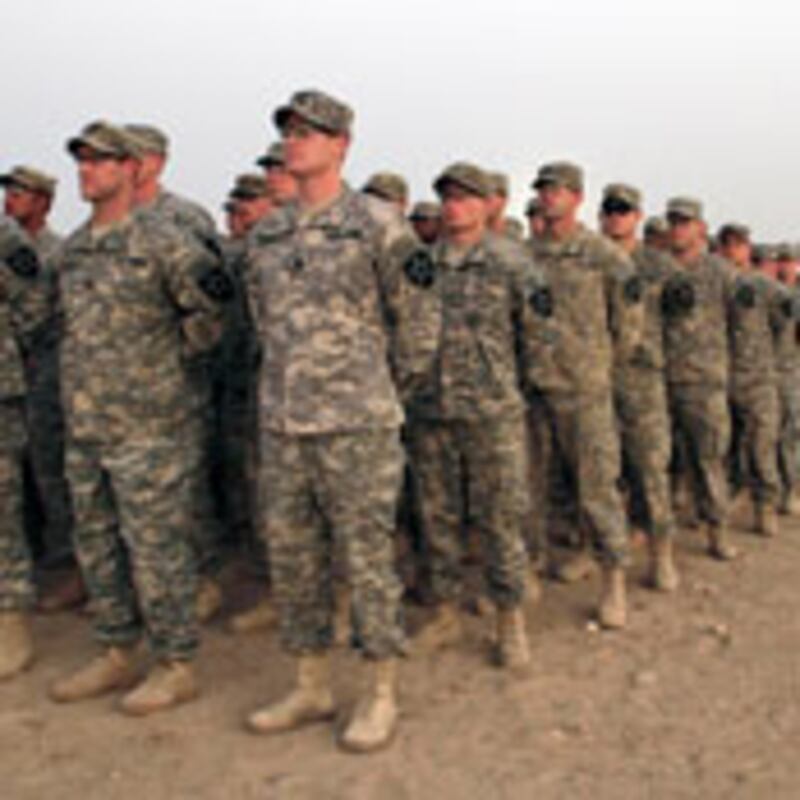
By the end of this month, all combat operations in Iraq will officially be over—a date much trumpeted by the administration. After all, to end that war was President Obama's campaign promise.
But August 31 is not much of a milestone. The big shift happened last year, when American troops withdrew from the cities and stopped going on patrols.
Having lived in Baghdad at the height of the war between 2005 and 2007 as a staff writer for the Los Angeles Times, it was striking to come back then and see how the city had changed, especially in terms of the visibility of American troops.
The man I saw, facedown in a ditch near the Tigris River, was not a victim of death squads (as I first thought) but a reveler who had had too much whiskey.
When I first arrived on a winter's day six years ago, the airport building looked desolate, as if abandoned in a rush. The shelves in the shops were barren and the concourse was empty except for a band of Kalashnikov-carrying mercenaries and a couple of listless porters in dirty blue overalls.
In the dying light, I could barely make out the airport road, pockmarked by bombs and the detritus of war: burned-out car wrecks and craters of soot that evidenced recent explosions. To better control the terrain, the soldiers had torched the grass and the brushes along the road, leaving a bleak and desolate landscape. Charred palm trees loomed over the road like gnarly fingers up through the ground. On military maps and among the headquarters brass, the road was known as Route Irish. But the soldiers on the ground, always more in contact with reality, had nicknamed it The Highway of Death.
There were no rules in Baghdad traffic except for this: Getting too close to American convoys exposed you to their guns but also put you in the insurgents' line of fire and, ahead of us, a line of cars crawled along, staying several hundred feet behind a U.S. convoy. Each of the Humvees had a sign tagged to the back warning drivers in English and Arabic to stay away or be shot.
Officially, the war was over—President George W. Bush had already made his triumphant speech announcing Mission Accomplished. Yet, every day there were more than 100 attacks around the country.
During the next two years, the violence grew, making a lie of claims of progress. During those years, more than two U.S. troops were killed on average every day and thousands of Iraqis were killed by Americans—or each other—in a conflict that seemed like it would never end.
Leaving to come back to the States to cover the 2008 presidential election felt like leaving in the middle of a story, abandoning a novel before the end. And when I got an opportunity to go back again last fall in connection with research for a book I was writing, I was eager to go.
• Andrew J. Bacevich: Stop Pretending the Iraq War Is OverArriving in Baghdad on a hot day in August, I noticed that, beyond the passport control, the duty-free shops had reopened, their shelves heavy with perfume and booze. Hassan, a driver I knew from the old days, picked me up—there were no guards or AK-47s, and, as we drove from the airport, I noticed other signs of change. The once-forbidding airport road seemed almost festive—scenes from Iraqi history had been painted in multicolored murals on the concrete barriers. The palm trees, once charred, had come back to life and, with their full green fronds, swayed tall and triumphant like sentinels along a procession road.
Later, on Haifa Street, once the dominion of radical insurgents, I saw a sky-blue Porsche idling in front of a checkpoint, and at the Baghdad Zoo, I watched Iraqi families admire lethargic flamingos. Along Abu Nuwass Street, strings of lights had been lit again above the reopened restaurants, and the man I saw, facedown in a ditch near the Tigris River, was not a victim of death squads (as I first thought) but a reveler who had had too much whiskey.
But what struck me most was driving around the city was never coming across a single U.S. soldier.
The American troops, who once dominated the streets of the capital in their tanks and Humvees, had been pulled back to their bases and no longer went on patrol. The Iraqi soldiers, who had taken their place, had decorated their checkpoints with garlands of yellow and pink plastic roses to celebrate the Americans' withdrawal.
Things had clearly gotten better but the soldiers' celebration was premature: Although more invisible, the U.S. is still robustly engaged in Iraq.
At the new U.S. Embassy in Baghdad—a fortification the size of the Vatican—civil servants continue to work to protect American interests, in a country so politically dysfunctional it still hasn't seated a government five months after the election.
Among the challenges is how to deal with the Arab-Kurd fault line and the disputed oil-rich city of Kirkuk. Beyond that, al Qaeda-affiliated groups and other Sunni radicals still operate in the country, as do Shiite militias, such as the Promise Day Brigades, an offshoot of Moqtada Sadr's Mehdi Army. The political situation is still unresolved, and political instability may sow violence again. And then there is the question of Iran...
"Contrary to the perceptions of some, this transition in the nature of U.S. presence in Iraq does not imply strategic disengagement," Colin Kahl, the deputy assistant secretary of Defense for Middle East affairs, told reporters at in Washington D.C. this week. "We're not disengaging from Iraq; our engagement will increase. It's just the ratio of military versus civilian engagement is changing."
Part of that change is the consolidation of the State Department's presence throughout the country. Beyond the embassy in Baghdad, there will be two consulates as well as two "embassy branch offices" in strategically important and/or volatile cities. Furthermore, 16 so-called provincial-reconstruction teams (comprising State Department and military officials) will remain in place for now, to advise the Iraqis on rebuilding and construction budgets, among other things.
"Advise and assist" is the popular term for the mission. But while administration officials like to highlight the advice part, the operative word is still "assist."
In addition to the beefed up State Department presence, a contingent of 50,000 troops will stay in the country until the end of 2011, and, as the president himself acknowledged in a speech to U.S. veterans this month, Americans will continue to die in Iraq. "The hard truth is we have not seen the end of American sacrifice in Iraq," he told the veterans, before drumming home his message: "Make no mistake: Our commitment in Iraq is changing—from a military effort led by our troops to a civilian effort led by our diplomats."
Col. Barry Johnson, a military spokesman in Baghdad, told me by phone that while the military real estate in the country has been significantly reduced, it is still sizable: There are today 92 operating bases in Iraq, down from a high of more than 500 at one point. Johnson also laid out the impressive workload for the six "advise and assist" brigades. The troops will continue to train the Iraqi army and police and will also provide help with logistics, air support, and surveillance—operating the ubiquitous unmanned aerial vehicles for reconnaissance as part of the intelligence-gathering operation—as well as provide security for State Department, NATO, and U.N. personnel. And here is the thing that no officials have been keen to talk about: American troops will still participate in counterterrorism operations, because, despite years of training costing billions of dollars, the 660,000 Iraqi security forces still can't operate fully without help.
Iraq is not yet a stable country, and for those 50,000 troops left behind, the end to major combat operations may feel like a conclusion in name only. They—and we—are still engaged in Iraq.
Louise Roug is an editor at The Daily Beast. She previously worked as a foreign and national correspondent for the Los Angeles Times, living in Baghdad and the Middle East for several years. She is a Pulitzer finalist and a recipient of a Hal Boyle Award from the Overseas Press Club. She just finished her first book.






